The abortion pill regimen is currently only approved by the U.S. Food and Drug Administration (FDA) through 70 days (10 weeks) gestation. But the abortion industry, including Planned Parenthood, has been committing chemical abortions past this time frame, flouting the FDA’s limits. Now, Planned Parenthood is publicly promoting on its website a gestational limit for the abortion pill regimen that goes beyond these FDA limits.
That 10-week FDA limit is still in effect — and while Planned Parenthood once abided by that limit, the corporation’s national website now claims, “In general, you can have a medication abortion up to 77 days (11 weeks) after the first day of your last period,” which is 11 weeks gestation — one week later than the FDA’s gestational limit. In some Planned Parenthood locations, the drug is prescribed at an even later gestation.
The extended limits not only flout the FDA’s safety regulations (known as REMS) for the abortion pill, but violate limits published on the websites of both manufacturers Danco Laboratories and GenBioPro.
Most Planned Parenthood abortion clients choose the abortion pill
According to the FDA’s website, Mifeprex (mifepristone) was first approved “in September 2000 for medical termination of pregnancy through seven weeks gestation and this was extended to ten weeks gestation in 2016.” Mifepristone (200 mg) was approved for this purpose as long as it was used in a regimen with a second drug — misoprostol. These two drugs used together comprise the abortion pill regimen.
Planned Parenthood charges “around $580” for this two-drug regimen, which they claim can also cost up to $800. The president of Planned Parenthood recently claimed that “about 70% of their patients choose medication abortion.”
A look at Planned Parenthood’s 2022-23 annual report reveals that the corporation committed a total of 392,715 abortions that year — its highest annual number recorded to date.
If we multiply those 392,715 total abortions committed by Planned Parenthood in 2023 with its president’s 70% figure, we can estimate that nearly 275,000 abortions at Planned Parenthood were committed by abortion pill that year.
The later in pregnancy it is used, the less effective it is
As gestation increases, the abortion pill regimen’s efficacy rate decreases — meaning that the later in pregnancy the abortion pill regimen is used, the less successful it will be in ending a preborn child’s life.
If the abortion pill fails, it can either mean that the baby is still alive, or it could mean that the baby’s remains are still in the woman’s uterus and have the potential to lead to infection. In the latter case, more pills or a follow-up surgical abortion may be prescribed to prevent serious adverse events.
In an attempt to prevent abortion pill failures, Planned Parenthood has added additional dosages of the second drug, misoprostol, when prescribing/dispensing the regimen. (The side effects of misoprostol can include stomach pain, uterine contractions, cramping, diarrhea, heavy bleeding, endometritis, and more.)
Below is the text from Planned Parenthood’s website for potential failure rates by weeks. Based on the 275,000 chemical abortion estimate above, potential abortion pill failures could be in the range of 5,500 to 35,750 per year:
- 8 weeks pregnant or less: 94-98% effective, with a reported 2-6% failure rate [estimated 5,500-16,500 failures in 2023].
- 8-9 weeks pregnant: 94-96% effective, with a reported 4-6% failure rate [estimated 11,000-16,500 failures in 2023].
- 9-10 weeks pregnant: 91-93% effective, with a reported 7-9% failure rate [estimated 19,250-24,750 failures in 2023].
- With an additional dose of misoprostol, it is 99% effective with a reported 1% failure rate [estimated 2,750 failures in 2023].
- 10-11 weeks pregnant: 87% effective with a reported 13% failure rate [estimated 35,750 failures in 2023].
- With an additional dose of misoprostol, it is 98% effective with a reported 2% failure rate [estimated 5.500 failures in 2023].
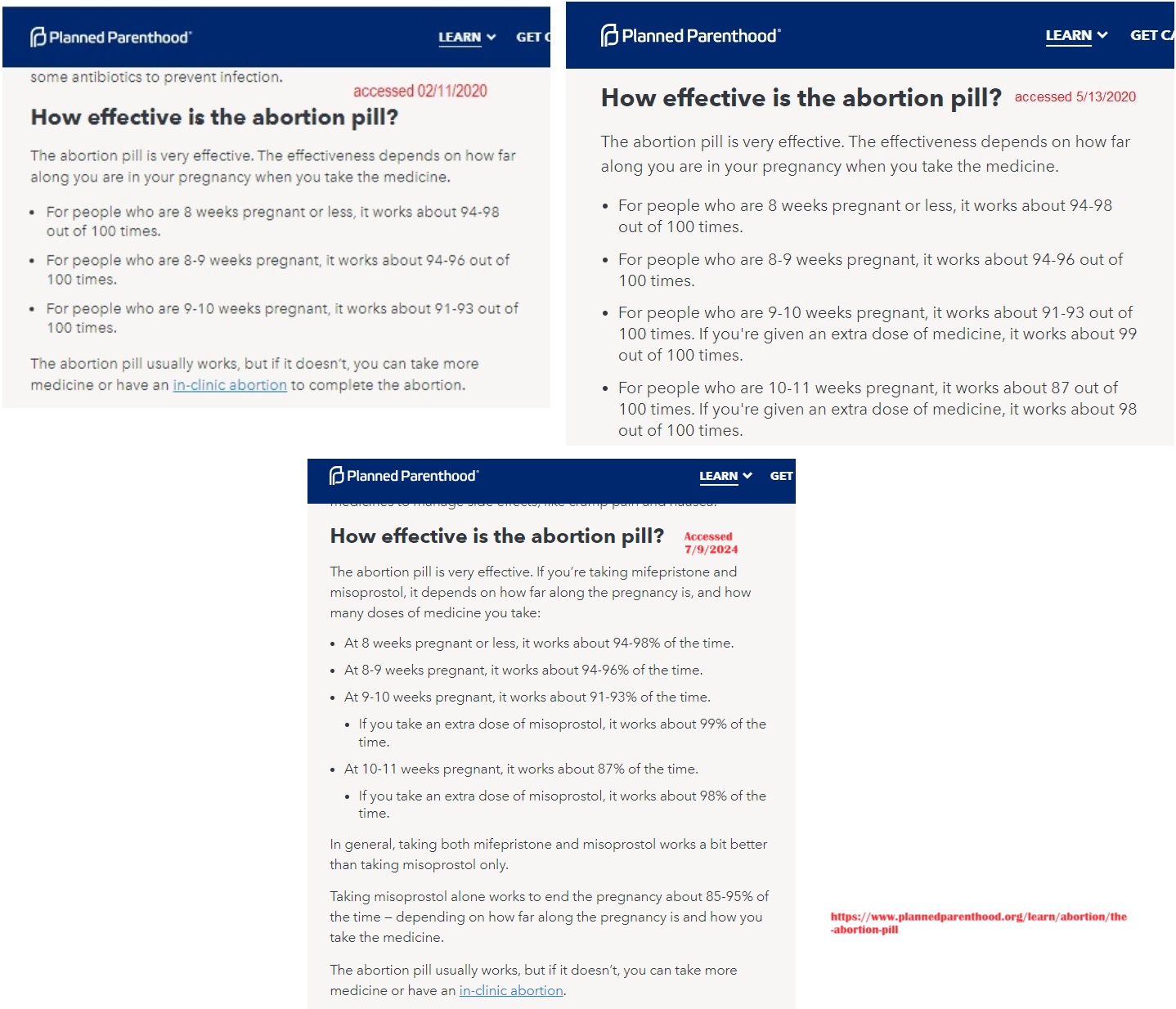
Planned Parenthood abortion pill website changes on failure rates
Some Planned Parenthood facilities prescribe to 12 weeks
In some locations, Planned Parenthood is now prescribing the abortion pill even later than 11 weeks, despite admitting on its website, “The abortion pill is very effective, but it works less well when you’re more than 8 weeks pregnant. The effectiveness depends on how far along you are in your pregnancy and when you take the medicine. After 11 weeks, there’s a bigger chance of stronger bleeding or cramps.” (This seems unsurprising, if an additional dose of misoprostol — known to cause those side effects — is taken by the abortion client.)
Reports from the Centers for Disease Control and Prevention (CDC) have indicated that the abortion pill is being prescribed well into the second trimester — and lawsuits filed against Planned Parenthood have revealed that preborn babies were killed very late in pregnancy after the corporation prescribed the regimen.
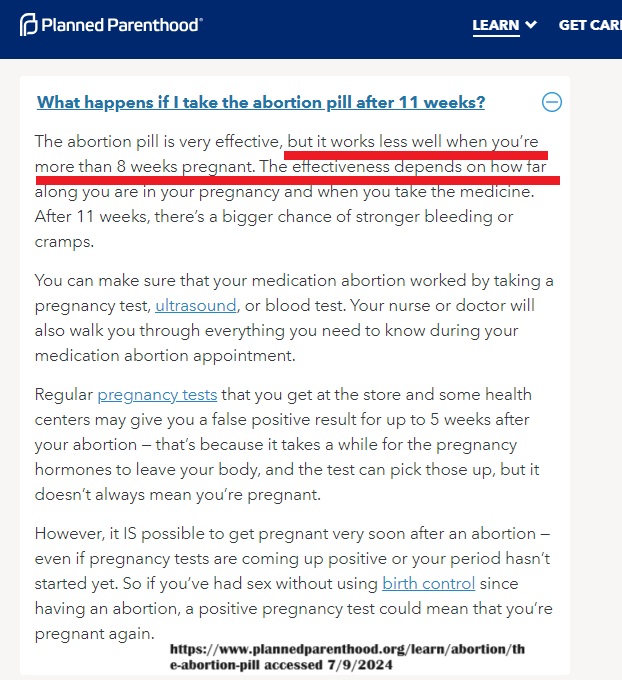
Planned Parenthood website acknowledges abortion pill past 11 weeks not as effective
Gynuity Health Projects (GHP), a pro-abortion group with ties to eugenics, began testing the abortion pill for FDA approval up to 84 days, or 12 weeks — a point at which the preborn child’s bones are beginning to calcify (harden), and when studies indicate that the child has the capacity to feel pain.
Two Planned Parenthood affiliates took part in that trial. Now, Planned Parenthood Great Rivers (PPGR) has announced plans to commit abortions through 12 weeks gestation, according to their X account and local news reports.
Sometimes you just need a little more time. ⏰ Now you can get the abortion pill through Planned Parenthood Great Rivers up to 12 weeks of pregnancy. Make a telehealth appointment or an in-clinic appointment at our Fairview Heights, IL, health center at https://t.co/U2xFVUFCZO. pic.twitter.com/tIpxjqUpX4
— Planned Parenthood Great Rivers (@ppgreatrivers) July 8, 2024
The PPGR affiliate recently changed its name from Planned Parenthood of the St. Louis Region and Southwest Missouri, and expanded access to the abortion pill in Illinois via its Planned Parenthood “PPDirect” app. Planned Parenthood facilities in additional states are also using this app for telabortion purposes.
The name change could serve to hide from the public the affiliate’s less-than-stellar reputation. Earlier this year, a former staffer accused the organization of terminating her position because of race. The affiliate has also been entangled in gender transition lawsuits and was exposed for multiple emergency incidents and abortion injuries in St. Louis, Missouri, when they operated under the name Reproductive Health Services Planned Parenthood.
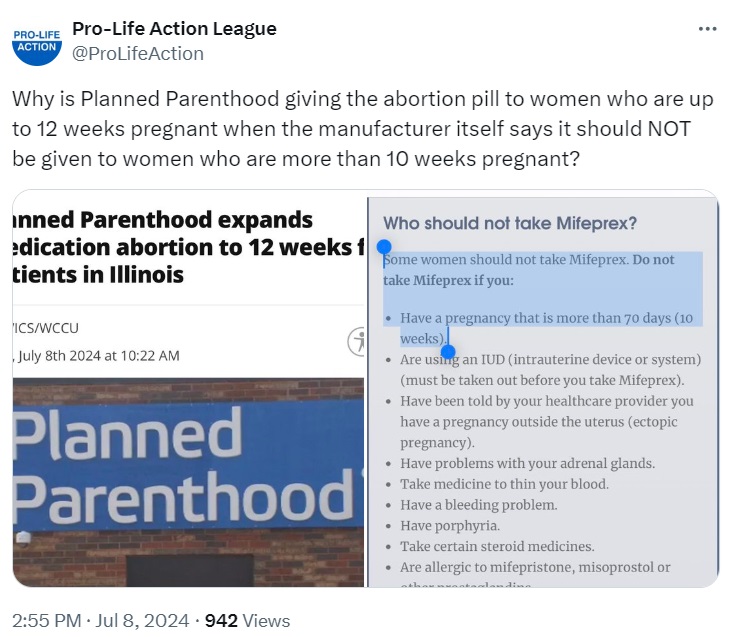
Pro-Life Action League Tweet on Planned Parenthood prescribing abortion pill at 12 weeks (Image: X)
Planned Parenthood promotes less effective abortion drug
In a section entitled, “How effective is the abortion pill?” Planned Parenthood claims online that “The abortion pill is very effective. If you’re taking mifepristone and misoprostol, it depends on how far along the pregnancy is…” and that, typically, “taking both mifepristone and misoprostol works a bit better than taking misoprostol only.”
“Taking misoprostol alone works to end the pregnancy about 85-95% of the time,” the corporation admits, “depending on how far along the pregnancy is and how you take the medicine.” Yet, Planned Parenthood now also promotes a misoprostol-only regimen.
Planned Parenthood claims using misoprostol alone (vaginally, sublingually, or buccally) in place of the FDA-approved two-drug regimen is “safe, effective, and legal to use in states where abortion is legal.”
Planned Parenthood claims that misoprostol-only “works 85-95% of the time and can be used up to 11 weeks from the first day of your last period.” That means the misoprostol-only regimen could fail between 5% to 15% of the time, making it possible that this protocol, unapproved by the FDA, could have potentially resulted in thousands of failures — which, again, may call for follow-up surgery.
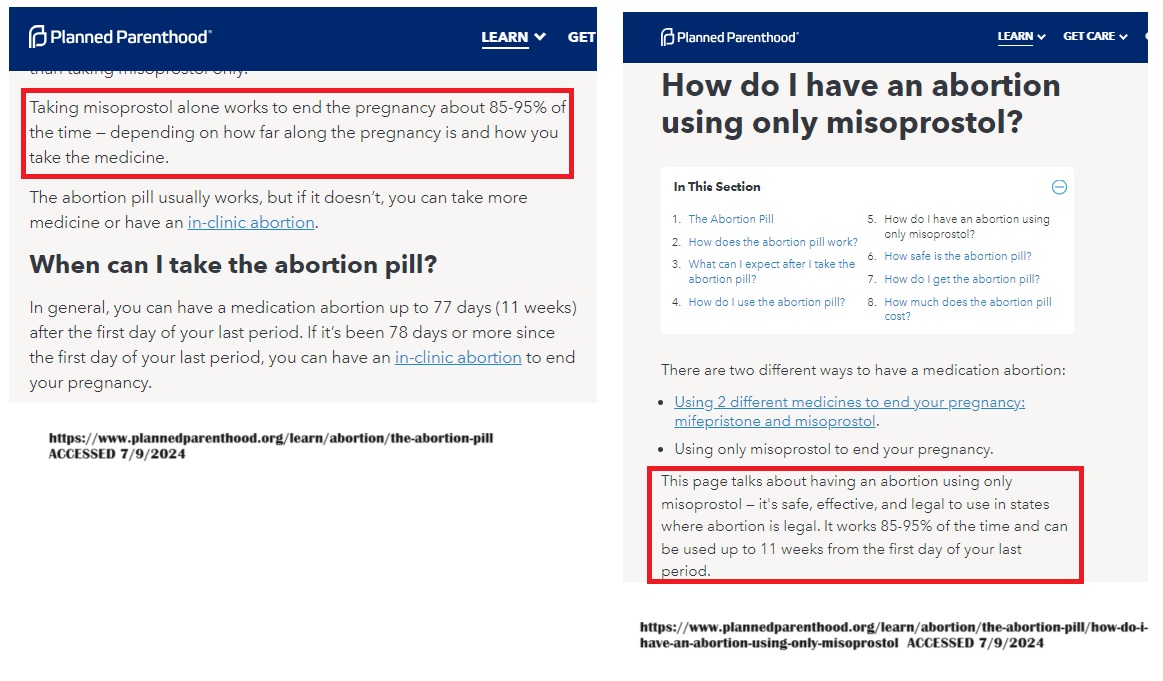
Planned Parenthood promotes misoprostol only abortion up to 11 weeks
Deceptively marketing the abortion pill
Planned Parenthood touts the abortion pill as ‘safer than Tylenol,’ and its website claims the abortion pill is “kind of like having a really heavy, crampy period, and the process is very similar to an early miscarriage.”
“Serious complications are really rare, but can happen,” Planned Parenthood writes. These include:
- the abortion pills don’t work and the pregnancy doesn’t end
- some of the pregnancy tissue is left in your uterus
- blood clots in your uterus
- bleeding too much or too long
- infection
- allergic reaction to one of the medicines
Yet, Planned Parenthood’s deceptive marketing fails to mention that the FDA’s own 2023 mifepristone label included serious potential complications. Mifepristone is also one of the limited number of drugs that includes a black box warning.
The FDA’s mifepristone label openly acknowledged that 2.9 to 4.6% of women who take abortion drugs end up in the emergency room. Knowing this, national abortion pill statistics would indicate that abortion pill-related ER visits could potentially be in the tens of thousands annually.
Using the aforementioned 275,000 chemical abortions from Planned Parenthood in 2023, it is possible that 8,000 to 12,650 emergency visits could have occurred among Planned Parenthood’s abortion pill clients.
In addition, the FDA’s medication guide acknowledges that as many as seven percent (7%) of women will need surgery after taking mifepristone “to stop bleeding” or to complete the abortion — a number potentially nearing 20,000 for Planned Parenthood clients alone.
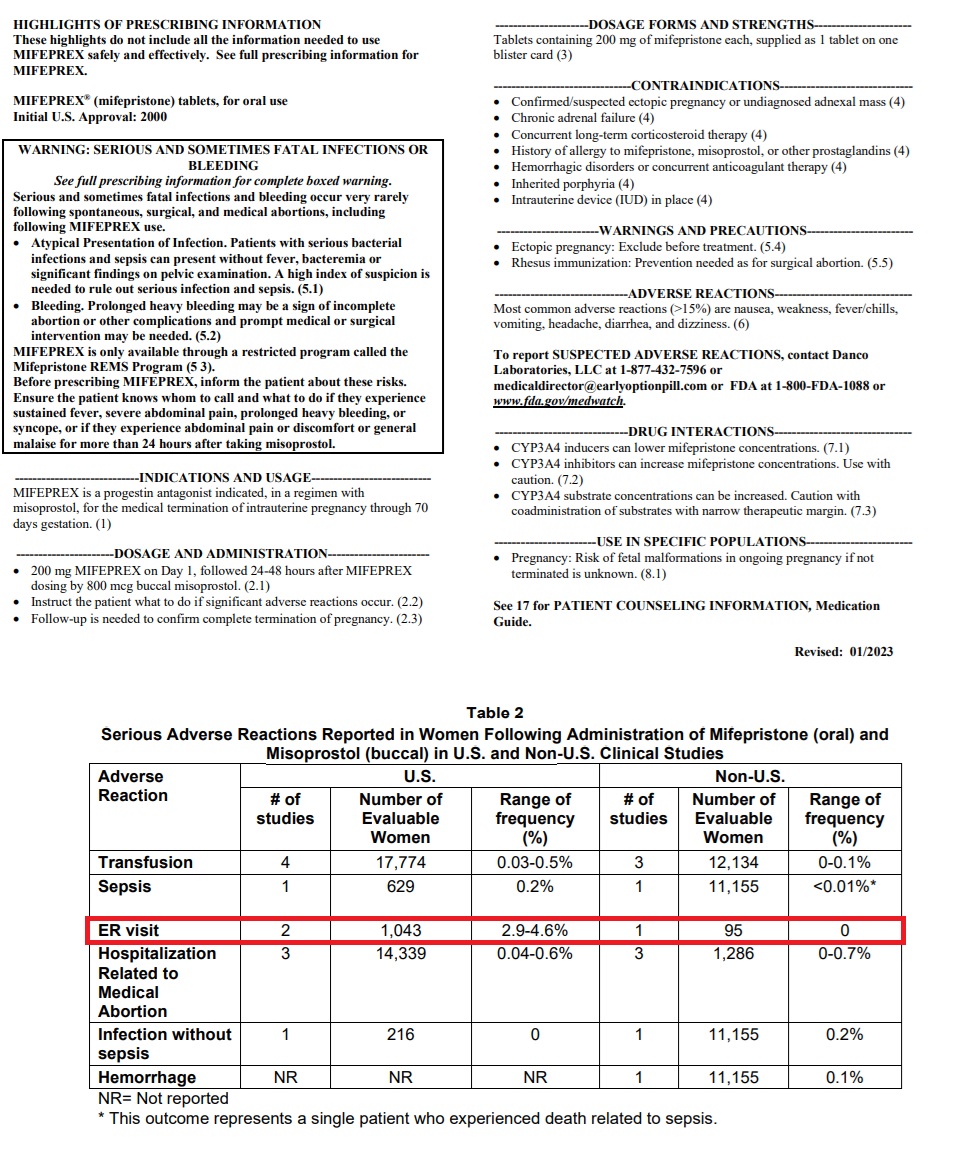
Mifepristone Jan 2023 label shows percentage of women taking abortion pill visit ER
Planned Parenthood uses other forms of deceptive marketing as well. Read more about those here.
An unplanned consequence: Abortion regret and trauma
While Planned Parenthood claims abortions are safe and simple, a video uploaded to its website claims that “feeling a wide range of emotions is common after an abortion,” but “everyone is different.”
“You may feel anger, anxiety, sadness and relief. Maybe all at the same time,” the video claims. And this is true for many women immediately following an abortion. However, those immediate feelings can give way to much more serious emotions later on — especially for women who see the bodies of their aborted children after taking the abortion pill.
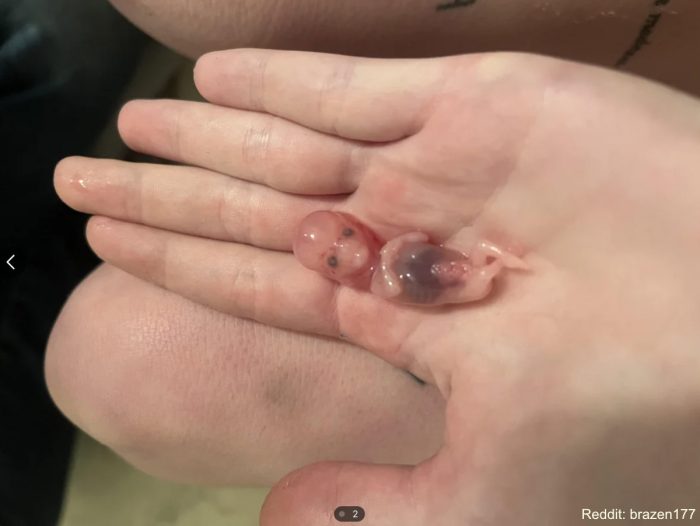
Photo of 10-week aborted baby: Reddit user brazen 177
But Planned Parenthood, though it largely denies the reality of abortion trauma and regret, tells women, “If you feel depressed or have big mood changes after a few weeks,” to “call your nearest Planned Parenthood…for help” instead of a licensed therapist or a pregnancy resource center that offers post-abortion counseling and support groups at no cost.
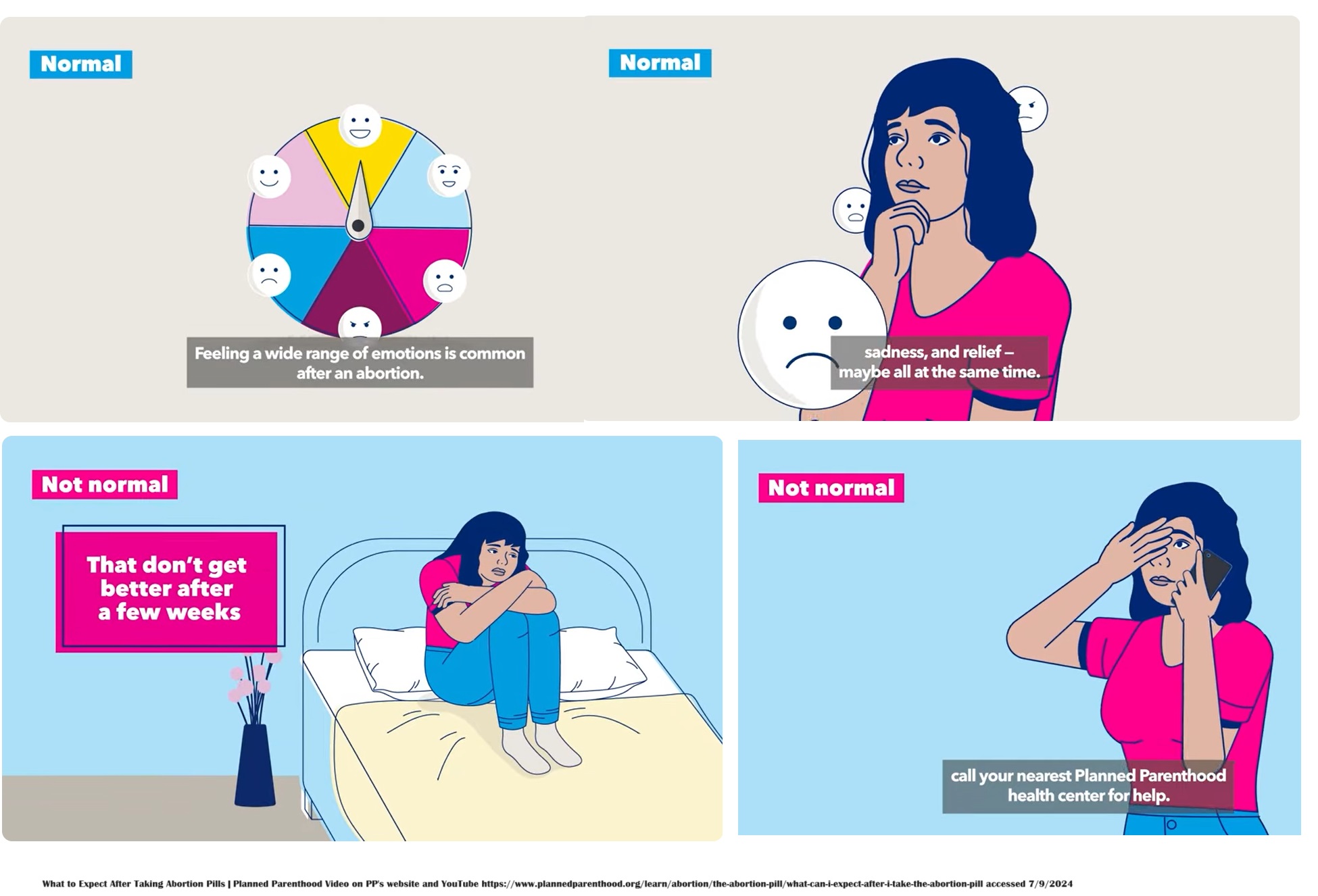
Planned Parenthood abortion pill video claims you can experience anxiety and regret and possibly depression
Live Action’s I Saw My Baby and Can’t Stay Silent websites further confirm how women experiencing abortion regret and trauma are not alone.







